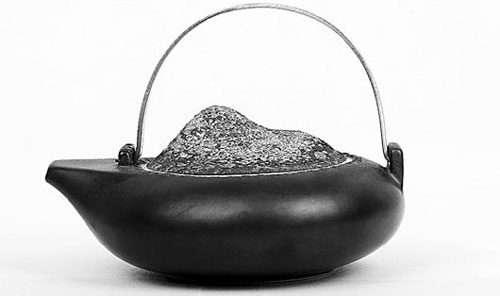
Landscape Teapot designer Ran Xiangfei won best tableware design at the Elle Decoration International Design Awards (EDIDA) 2012 China. Provided to China Daily
Ran Xiangfei could easily be mistaken as an undergraduate student strolling into the Shanghai Italian Center exhibition hall.
But he is there as the winner of the best tableware design at the Elle Decoration International Design Awards (EDIDA) 2012 China.
His work, Landscape Teapot, will join other award winners to compete in the global EDIDA at the Milan Design Week in April 2013.
"Landscape Teapot reflects Chinese people's special sentiment toward the moon," Ran explains.
Wearing an oversized black sweater, the 25-year-old postgraduate student from Jiang Nan University in Wuxi, Jiangsu province, is the youngest of this year's winners.
One of the most recognized awards in the world design scene, EDIDA will be featured in 25 editions of Elle Deco all over the world.
China joined the event in 2004 to promote local designers' masterpieces in various aspects of modern living, including furniture, seating, tableware and wall covering.
"We are impressed by the designers' deep understanding and adept use of the cultural and traditional elements of China, as well as their ability to create works that are functional and beautiful for modern lifestyle," says Chu Manlu, chief editor for the Chinese edition of Elle Decoration.
Full of praise for Ran's design, Chu says: "He submitted a teapot design for the EDIDA China 2011, but didn't win. This year, we were surprised with his improvised and mature work. He has perfected the design."
The pot features a horizontal profile, with the lid in the shape of a mountain, and the handle like a half-moon rising from the ocean. The mouth of the pot is shaped in such a special angle that when you tilt the pot to pour water, it looks like water falling down a cliff.
"The moonrise gives a sense of homesickness. Like poetry that can't be perfectly translated into another language, this visual and emotional connection exists only among us Chinese," Ran explains.
"A cup of Chinese tea will evoke the feeling of home sweet home, wherever you are.
"It took me and my friends a lot of effort to create a special glaze for the lid. We wanted to present a texture that is like landscape paintings in traditional Chinese ink art, and at the same time rough on the surface and lightweight, so that anyone can pick it up easily with two or three fingers."
Ran says that adding the copper handle to the ceramic pot was another challenge. In Jingdezhen, Jiangxi province, craftsmen told him it could not be done through mechanical means.
"So, we had them individually installed by hand. But we later found out that in Japan, there has been a very established technique used to seal metal parts to ceramic," he says.
Ran says some designers have been pushing for a revival of handicrafts but they have limited influence.
Traditional Chinese intellectuals gave greater emphasis to what they wear or use, as if the items had lives of their own.
"By using an item, one believed he or she was nurturing it, transferring a little part of himself into the item," he explains. "There is only value in our designs when they are put to use. It is only relevant when it means something to people's lives."
On his part, Ran has founded a design company named "Sothing" with a few friends in the hope of promoting the use of Chinese handicrafts. Sothing has won several international prizes including "Best of Best" at the Red Dot Design Award in 2010.
A native of Hunan province, Ran has fond memories of the beautiful and poetic landscapes in his hometown.
The mist on the river has inspired him to create incense burners. "Smoke doesn't have a form. It is the burner that gives it shape," he says. "Repeated burning will leave marks on the burner, making the burner a unique possession of the owner."
Whenever Ran starts a new project, he makes it a point to visit the place of origin and work together with the local craftsmen. He is always ready to experiment with new techniques, and take risks.
"I am still young. Whatever happens, I can always start anew," he adds.
zhangkun@chinadaily.com.cn
